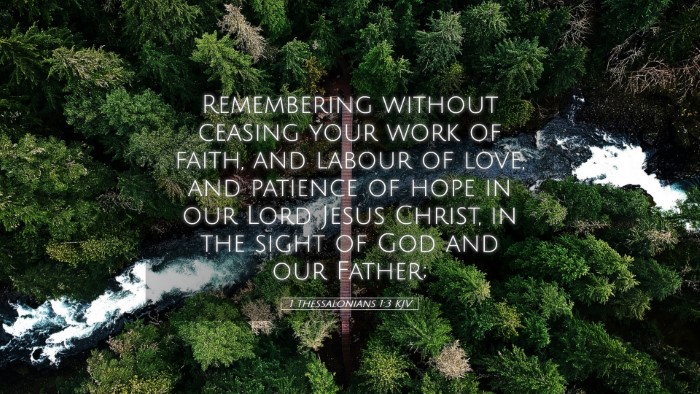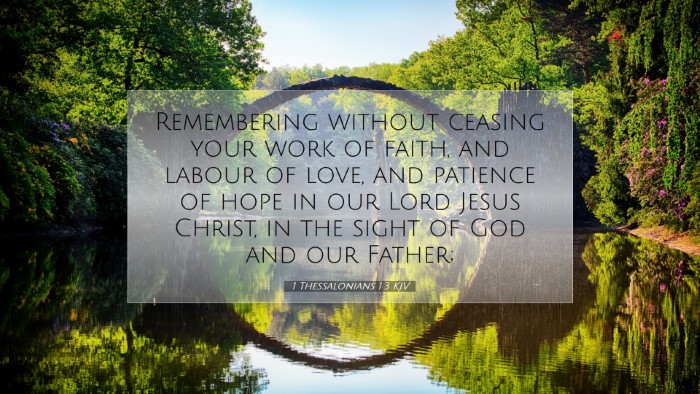Old Testament
Genesis Exodus Leviticus Numbers Deuteronomy Joshua Judges Ruth 1 Samuel 2 Samuel 1 Kings 2 Kings 1 Chronicles 2 Chronicles Ezra Nehemiah Esther Job Psalms Proverbs Ecclesiastes Song of Solomon Isaiah Jeremiah Lamentations Ezekiel Daniel Hosea Joel Amos Obadiah Jonah Micah Nahum Habakkuk Zephaniah Haggai Zechariah Malachi1 Thessalonians 1:3
1 Thessalonians 1:3 KJV
Remembering without ceasing your work of faith, and labour of love, and patience of hope in our Lord Jesus Christ, in the sight of God and our Father;
1 Thessalonians 1:3 Bible Commentary
Commentary on 1 Thessalonians 1:3
Bible Verse: 1 Thessalonians 1:3 - "Remembering without ceasing your work of faith, and labor of love, and patience of hope in our Lord Jesus Christ, in the sight of God and our Father."
Introduction
This verse serves as one of the central verses within Paul’s epistle to the Thessalonians, encapsulating the essence of the faith, love, and hope that characterize the Christian life. It provides a framework for understanding the early Christians' experiences and expectations, and manifests Paul’s pastoral heart as he encourages the newly formed church. The insights drawn from public domain commentaries elucidate the richness of this verse and its implications for believers.
“Remembering Without Ceasing”
Matthew Henry emphasizes Paul’s continual remembrance of the Thessalonians, which indicates a profound and genuine concern for their spiritual welfare. This ongoing remembrance highlights the necessity of prayer in the life of a believer. Henry notes that such remembrance should incite the mind to bring to God our friends and fellow believers in prayer, reflecting a heart of love and care.
Albert Barnes similarly states that Paul’s recollection of them was not merely casual but fervent, urging pastors and church leaders to maintain a heartfelt connection with their congregations. Barnes encourages readers to consider how often they pray for others and the importance of this in cultivating spiritual bonds within the church.
“Your Work of Faith”
This phrase encapsulates the active response of believers to the gospel. Adam Clarke interprets “work of faith” to mean that faith, though a gift from God, results inevitably in actions that demonstrate its authenticity. True faith produces works, and these works are a manifestation of one’s belief in Christ. Clarke emphasizes that faith must express itself through action to be genuine.
Matthew Henry adds that this work is laborious and involves effort. The Thessalonians were not passive recipients of grace but actively engaged in serving, spreading, and living out their faith. This highlights a vital characteristic of the early church’s dynamic, a model that contemporary believers should strive to emulate.
“Labor of Love”
The notion of "labor of love" speaks of the hardships endured because of love—the love for God and for one another. Albert Barnes notes that this labor is often burdensome yet joyous if rooted in love. The sincere love evident in the Thessalonians’ actions reflects the transformative power of the gospel in their lives.
Adam Clarke further explains this love as not merely an emotion but an active force that compels believers to serve others. Laboring out of love means undertaking tasks that may not confer immediate rewards but reflect Christlike commitment. It sets a standard for love in action that is essential for church leaders to consider as they shepherd their congregations.
“Patience of Hope”
Patience in the face of trials is underscored here, coupled with the hope that arises from a relationship with Jesus Christ. Matthew Henry discusses the concept of hope as an anchor for the soul, providing stability amidst adversities. He emphasizes that this hope is not wishful thinking but grounded in the firm promise of the Lord’s return.
Albert Barnes explains that the Thessalonians, in their trials, exhibited a resilience buoyed by the hope they had in Christ. This patience serves as a lesson for believers today about the nature of enduring faith—maintaining a steadfast spirit while looking forward to the consummation of Christ’s work.
“In Our Lord Jesus Christ”
The phrase establishes the foundation of their work, labor, and patience in a personal relationship with Jesus Christ. Adam Clarke notes that the emphasis on “our” signifies a shared faith community, reminding readers that they belong to Christ collectively. This communal aspect of the faith is essential, as it fosters unity and mutual support in the Christian journey.
Matthew Henry highlights how all Christian endeavors find their significance and potency within the Lord Jesus. It’s a reminder to Christians today that their actions should be anchored in their identity in Christ, thus ensuring that every labor, whether in faith or love, directs glory back to Him.
“In the Sight of God and Our Father”
This final phrase serves to remind the Thessalonian believers that their actions dwelled under the scrutiny and watchful care of their Heavenly Father. Albert Barnes elucidates that knowing they are in the sight of God serves both as a comfort and a caution. It reassures believers of God’s presence while prompting them to conduct their lives in a manner worthy of His gaze.
Matthew Henry adds that living in the sight of God imbues believer’s labor with eternal significance; their efforts are not in vain, as God sees and acknowledges the heart behind their actions. This perspective challenges contemporary believers to align their motivations and actions with God’s will, ensuring that all serves to glorify Him.
Conclusion
This verse is pivotal for understanding the fundamental components of the Christian life: faith, love, and hope. The combined insights from the commentaries of Matthew Henry, Albert Barnes, and Adam Clarke reinforce the imperative for believers to actively live out their faith amidst trials, rooted in genuine love for God and one another, and anchored in the hope of Christ's return. For pastors, students, and theologians, these reflections inspire and challenge the church to embody the vibrancy of the Christian life as exemplified by the Thessalonians—a model of faithfulness in action, sustained by the grace of God.


